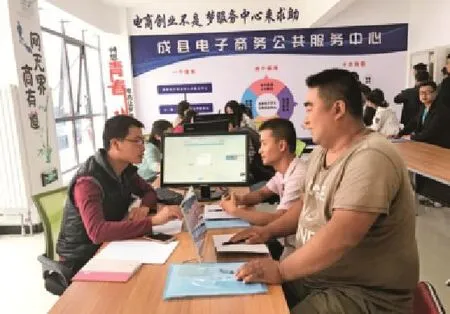E-Commerce Poverty Alleviation in Longnan City
By JIAO MENG
E-Commerce Poverty Alleviation in Longnan City
By JIAO MENG

The frst national public e-commerce school was established in Longnan Teachers College in 2015.
LI Shengrong no longer dreams of escaping poverty. The 54-year-old, from Gansu Province, northwestern China has seen massive changes due to e-commerce. His home in Caotan Village, Chengxian County, Longnan City, is 80 kilometers away from the county seat, and for a long time had no access to highway, electricity and postal services, let alone the Internet.
“I used to leave home at 5 a.m. to sell eggs at the county fair and come back at 10 p.m,” He said. “Whenever the mud roads on the mountainside were destroyed by heavy rains, I would have no choice but stay at home.” Now, things are quite different.
“Now, my free-range chickens and eggs can be conveniently sold through our village Taobao shop. Starting with a mere 14 chickens, I have sold over 1,000 online. My earnings increased by more than RMB 4,000 this year.” When asked about his future plans, Li Shengrong said he wanted to scale-up sales to 1,500 birds and see his organic chickens served on tables in big cities.
Dramatic Changes in the Village
Within three years, isolated Caotan Village has fourished thanks to the policy of alleviating poverty through e-commerce. Chengxian County has wonderful organic produce, typical of the area, but until recently farmers were unable to access the wider market and, as a result, village incomes were low. Encouraged by national policies targeted at alleviating poverty, the county government introduced the idea of e-commerce to small impoverished villages. By installing an Internet cable connection and creating an online village shop, they were able to connect the organic produce with consumers. They also supported and promoted the initiative by providing project support, policy services, express logistics, and online stores.
In September 2013, Chengxian County government began to encourage college graduate village offcials to open online shops and also held their frst ecommerce training class. Zhang Xuan took the lead, launching her own Taobao store named “Treasures of Jifeng Mountain,” helping villagers to sell local produce and earn more.
In the beginning, Zhang borrowed RMB 100,000 from her parents to pay for start-up costs. “Fresh eggs should be very carefully packed in case of damage during long-distance transport. Each time the online custom-made packing fee would be nearly RMB 100,000,”Zhang recalled.
Living in remote mountain areas and lacking basic knowledge of the Internet, villagers were reluctant to sell their produce online. Zhang decided to visit local households one by one with her custommade egg-packaging to eliminate the villagers’ worries. She took a notebook with her and recorded the amount of local honey and chickens that each family had. Tirelessly she managed her online business and kept explaining the sales process and policies to other villagers. The first few months, however, did not see any profits and the villagers began to doubt her enterprise even more. Some didn’t believe that local products could sell online at a higher price. Zhang did not give up so easily. “I heard thatWeibo [microblogging] and WeChat [an instant messaging service] were popular, so I posted some pictures of the scenery around our village and introduced the local specialties on my Weibo. Unexpectedly, my frst order came from a netizen in Shanghai!”
Thanks to Zhang Xuan’s hard work, a poor village with a lack of vitality has been invigorated. Now, every villager can beneft from the online store. The market price of one egg has increased from RMB 0.5 to 2 and one local chicken now goes for RMB 20 instead of 10.
Walnut-seller Becomes Online Star
Li Xiang, the party secretary of Caotan Village, is an online star. He is famous for selling walnuts online and has over 200,000 fans on Weibo. Chengxian County has also become a beacon for small-scale e-businesses scattered among obscure counties in the vast provinces of northwestern China. Leading the way, Longnan City has developed no less than 2,900 governmental micro-blogs and over 370 official government Wechat accounts.

Online store owners are trained at the E-commerce Service Center of Chengxian County.
In 2015, the CPC Central Committee and the State Council announced the Decision on Winning the Battle Against Poverty, which formally named “poverty alleviation by means of e-commerce” as part of their anti-poverty project. These strategies have filtered from central government to different levels of local government, and have been implemented in e-business enterprises and social organizations. As the frst national pilot city using e-commerce to alleviate poverty, Longnan City has built a network between online stores and brickand-mortar businesses and forged a direct connection between farmers and consumers. The city has also managed to balance rising income with changing mindsets, successfully creating steady employment for 56,000 people and a RMB 430 average increase per capita in the incomes of 640,000 locals.
In Longnan City 735 online shops for 450 impoverished villages are included in the pilot project, which involves 97,000 people from 24,500 disadvantaged families and has raked in sales collectively amounting to RMB 253 million. To implement the project, a working mechanism was formed where multiple groups joined hands to promote poverty alleviation using e-commerce, bringing together efforts from the government, various associations, and work teams stationed in villages to promote e-business. A consumer service system has been put in place, with 150 township service stations, 495 village service points, and over 9,000 different online shops. This year, Longnan’s total e-business sales hit RMB 741 million (RMB 286 million online and RMB 455 million offine).
There are also 83 network commodity supply platforms in the city, which collectively sell 629 varieties of 1,126 different products, including popular new items such as Longnan olives, Chengxian County walnuts, Wudu Chinese pepper, and Lixian County apples. In addition, 237 logistics companies, 786 express delivery stations and 1,200 village post offices have been set up, dramatically improving the effciency of the distribution network. This year alone, 29,000 people have taken the municipal government’s e-commerce poverty alleviation training classes and 128 unemployed college graduates have been sent to e-business enterprises in Zhejiang Province for a six-month vocational training course.
The Longnan Model
In Longnan, the success of the project to alleviate poverty through e-commerce has won over both offcials and the public, facilitated the improvement of rural infrastructure, improved village-to-city transportation networks, and regenerated local industry in the city with a total area of over 11 million mu (equivalentto 7.3 billion square meters). The lives of local people have been transformed, with Taobao, Weibo, WeChat, crowdfunding and mobile e-business entrepreneurships now widespread in rural areas.
CPC Longnan Municipal Committee Secretary Sun Xuetao explained that the city found its own “Longnan Model” tailored to help people from impoverished areas to sell their agricultural products, using a mixture of government promotion and supervision, enterprises operating on the market, participation from local people, assistance from various associations, and social media publicity strategies.
Statistics show that the Ministries of Finance and Commerce are vigorously committed to demonstrating that ecommerce poverty alleviation works and increasing support for comprehensive e-business models in rural areas. The State Council Leading Group Office of Poverty Alleviation and Development, in cooperation with the two ministries, has designated 496 participating counties nationwide (261 of which are impoverished, accounting for 52.6 percent). The three sides have agreed that they will achieve full e-commerce coverage of targeted poor areas over the next three years.
Qu Tianjun, an inspector with the Department of International Cooperation & Social Poverty Alleviation at the State Council Leading Group Offce of Poverty Alleviation and Development, commented: “The Longnan Model in northwestern China accumulates the experience of areas which are rich in agricultural resources but were restricted by lack of transportation. Its success proves that ebusiness miracles can happen in impoverished areas, if plans are made under guidance and take local conditions into consideration.”
Growing Pains
Vice-Governor of Gansu Province Yang Zixing pointed out that Gansu is one of the most impoverished regions in China. It has the seventh-largest number of people living in poverty, the second-highest percentage of people living in poverty and it has the lowest per capita income for rural residents in the country. Restrictions to growth include poor broadband Internet coverage, inefficient logistics and lack of distribution facilities, poor regulation of agricultural practices and no certifcation, and a lack of professional expertise in rural e-commerce development.
Longnan’s e-commerce poverty alleviation project has not been without“growing pains.” Wei Yan’an, director of the Rural Work Department with the Shaanxi Provincial Committee of the Communist Youth League, said that Longnan must overcome the diffculties caused by inadequate transportation, increase brand impact, and nurture leading enterprises. The e-commerce model should transform and expand to cover entire counties and gradually form a new e-business economy. It is essential to cultivate talent at different levels within the system, combining grassroots entrepreneurship with the development of established companies, as well as involving local e-commerce businesses and other investments, with the aim of building a district e-commerce hub.
“The practices of Longnan City demonstrate that e-commerce poverty alleviation is an eco-system,” Wei Yan’an explained. “Like an iceberg, what we see is just the tip of it foating on the sea. The whole e-commerce system should basically consist of three main parts: frontline services including the e-commerce trading platforms and online retailers; the middlemen of the e-business service system – service providers, payment services, express logistics, and e-business parks; and those behind the scenes, including leading enterprises, family farms and professional cooperatives. The part of the e-commerce trading system we can actually see is only a ninth of the iceberg foating on the surface; while huge parts of the e-business service system and industry support system are hiding under the water. Without them the whole eco-system would disappear like drifting ice melting into the water. We are happy to see that a comprehensive ecommerce system has been established in Longnan City, making their dreams of poverty alleviation come true sooner rather than later. “

Express packages are delivered from the Taobao store of Caotan Village every day.
Jiao Meng is a journalist with www.chinagate. cn, and head of global poverty reduction inclusive growth portal www.iprcc.org.cn.

